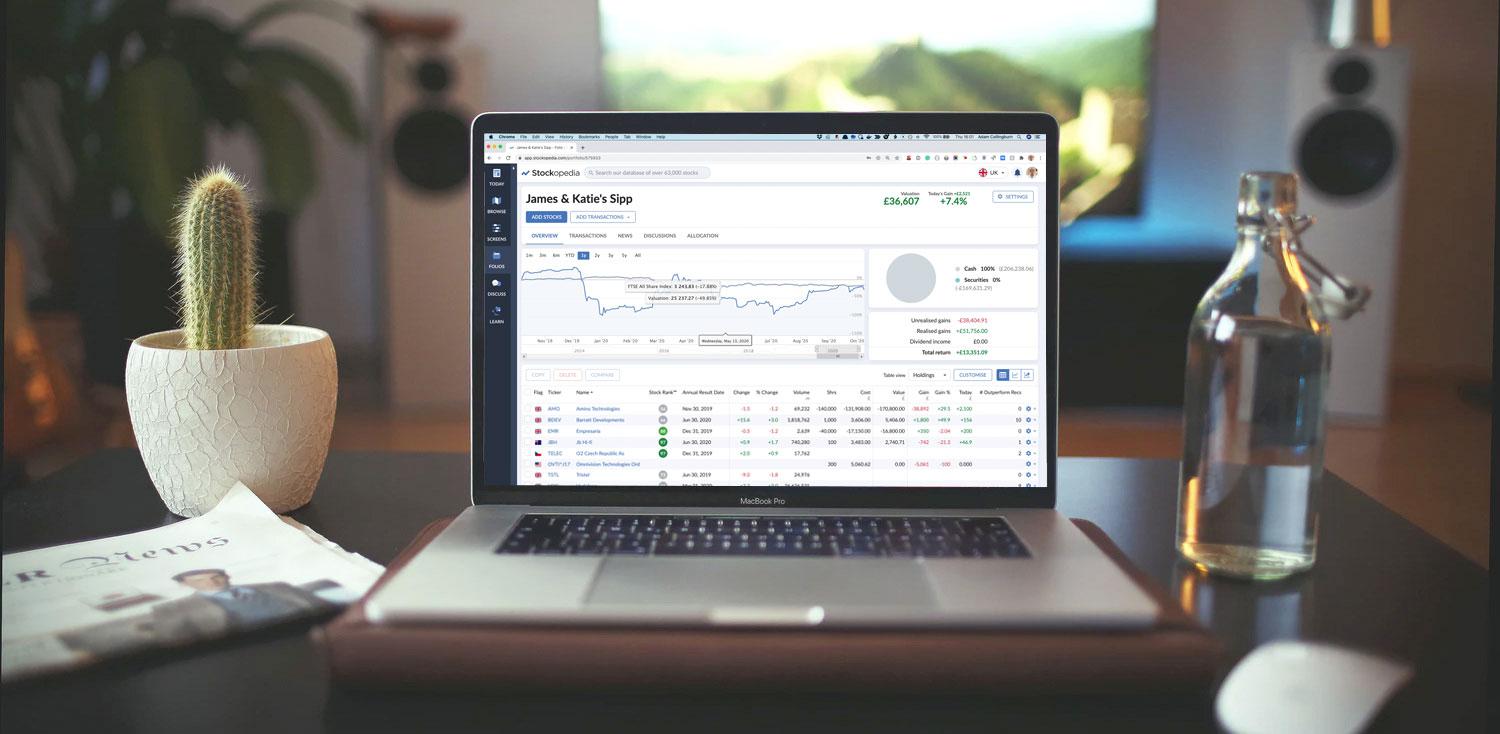David's Story

How did you pick investments before you used Stockopedia?
Tips from newspapers, investment magazines, Robbie Burns (but usually too late to pick up a stock at the bargain prices he does). I did have a go at screening using other tools but the novelty ran out quickly – doing research takes a lot of time to do properly and to be frank, can get quite boring (and I am an accountant!).
It takes a lot of effort and practice to do well and even then, without a deep understanding of an industry or company, the results are often no better than the market average. You might as well toss a coin – so better to leave to the professional fund managers, or the likes of Paul Scott, who has a well-honed approach to analysing results that I now rely on significantly.
Has using Stockopedia changed your approach to investing?
I’m now far more aware of momentum and quality and the underlying ratios that make them up, whereas before I put too much focus on the PE and PEG ratio (though the latter is still a fairly good indicator).
When I see any tips I go to Stockopedia to check them out; many a tip I now avoid if the Stockopedia page is flagging up some issues.
Also, now when I see any tips I go to Stockopedia to check them out; many a tip I now avoid if the Stockopedia page is flagging up some issues, whereas before I would just go for it and see what happened – with a 50:50 success rate, unsurprisingly.
I even avoid Robbie Burns tips if they don’t have a high Stockopedia ranking, which considering his success might be foolish but at least I feel now that I am using some informed discrimination in what I invest in.
A combination of Paul Scott comments combined with a high Stockopedia rating is usually enough now to convince me to put in a small amount and then build a position if the share continues to show promise.
I find that I am much more inclined to do some real digging into a company that I have some money invested in, even a small amount, keeping up to date with it’s news – particularly if it has impacted the share price. I find that actually owning a share and seeing the ups and downs is a good way to get to learn it’s idiosyncrasies and learn more about the company.
Just keeping it on my watch list doesn’t really encourage me to follow it to anything like the same degree. I am also more inclined to stick with a company whose share price has fallen without news flow if it has a high rating, whereas if it has a lower rating I will drop it like a stone, suspecting something might be wrong – before I wouldn’t discriminate and usually lose the bounce back of strong shares.
Finally, when the market crashes I am more inclined to hold onto my high ranked shares; usually turns out to be a wise decision.

David uses Stockopedia on his laptop and iPad to manage his investments.
Has this, in turn, impacted your investment results or quality of life?
I can either put my money in an investment/unit trust or have a go myself. The former has generally proven more stable with better returns. However, I have noticed a pick-up recently in my own performance, with high Stockopedia ranked shares doing particularly well, and by keeping the ones whose prices have risen, and losing the ones that were starting to show downward trends, my performance has improved.
What's your advice for investors that are just starting out?
Don’t be tempted to take profits on a share with a high Stockopedia ranking even if the price has risen strongly, just keep riding the growth. Don’t ever, EVER, try to catch a falling knife or be suckered into a dead cat bounce – just not worth it for the odd (and unlikely) occasion you may get it right.
Don’t invest on newspaper/magazine tips without checking out the Stockopedia rating first.
Don’t invest on newspaper/magazine tips without checking out the Stockopedia rating first – and also don’t invest the day after the tip has come out. Try not to buy a share outside of it’s normal spread – wait until the market makers have stopped playing their games and for the spread to close. Be ruthless on selling shares that have fallen on disappointing news flow, particularly if you weren’t that convinced of them in the first place. If a strong ranked share falls because it’s sector or market has fallen, don’t suffer a death by a thousand cuts by selling out, even if the price goes below your stop-loss; it will recover.
For high ranked shares that you are absolutely convinced about, everything in your gut (supported by good newsflow and the investment community) tells you is a promising but undervalued company, build as large a position as you dare – it is these shares that can make your fortune. If there’s one thing Brexit taught me painfully, it’s don’t panic sell the moment the market crashes on “bad news” – the market invariably recovers and unless a share’s fundamentals are badly impacted, if it’s a strong company it’s price will recover too.
When a high ranked company’s share price falls a lot in the morning for no apparent reason and no bad news flow, wait – the price often bounces back that afternoon or the next day. You get to learn a share’s prices natural rhythms over time through ownership, so become more immune to wild price swings for no apparent reason, and they are best just ridden through.
Disclaimer - Testimonials are provided by third parties for informational purposes only and are not intended and should not be taken to be financial product advice.
A subscription to Stockopedia will be one of the best investments you'll ever make...
Here's what you'll get:
- Find stocks likely to perform with proven Quality, Value and Momentum ranks
- Analyse shares in minutes, not hours with an all-in-one research platform
- Develop a consistent strategy with daily guidance and educational webinars
- Track and improve your results with portfolio analysis tools
- Become a self-reliant investor, saving thousands in advisory fees
Stockopedia is the perfect solution for active investors looking for more discipline and better results